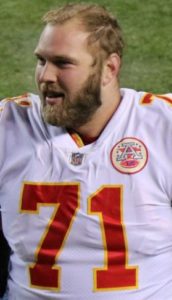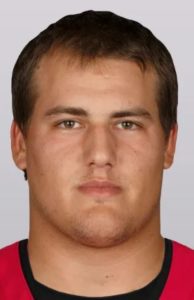Jewish Super Bowl Showdown

Mitchell Schwartz
(Credit: Jeffrey Beall)
Mitchell Bryan Mendel Schwartz (b. 1989) was born in California and raised in a religious Conservative Jewish home. By the time he started high school, he was 6’5″ and weighed 240 pounds—so he started playing football. Very quickly, he dominated the game, and just a couple of years later was California high schools’ Offensive Lineman of the Year. He was also an all-star baseball pitcher, and an honour roll student with a near-perfect GPA. Not surprisingly, many colleges wanted him, and he chose to go to UC Berkeley where he majored in American Studies. Over his four-year college career, he didn’t miss a single game. In 2012, Schwartz was drafted to the NFL by the Cleveland Browns. He went on to play all 16 games in his impressive rookie season. After several more successful seasons, he signed a 5-year, $33 million contract with the Kansas City Chiefs, making him one of the highest paid tackles in the sport. Schwartz wears his Judaism proudly, and co-authored a book with his brother Geoff (also an NFL player) called Eat my Schwartz: Our Story of NFL Football, Food, Family, and Faith. He is a big supporter of Kansas City’s Chabad of Leawood, and has lit the city’s public menorah. Last year, he helped lead the Chiefs to a Super Bowl victory. Until then, he had never missed a single game in his entire NFL career. Unfortunately, that incredible streak ended earlier this season, though his team still made it to the Super Bowl, and will face the Tampa Bay Buccaneers this Sunday. Meanwhile, Tampa Bay has their own Jewish all-star:

Ali Marpet
(Credit: buccaneers.com)
Alexander “Ali” Marpet (b. 1993) was born in New York to a traditional Jewish family. He was also a big high school football (and basketball) success. Marpet studied economics and public policy at Hobart College, which is not a particularly strong athletic school and doesn’t even award athletic scholarships. Only one other player in the history of the college ever made it to the NFL. Marpet went there anyways, and led their football team to multiple championship appearances. He was drafted to the NFL in 2016 by the Tampa Bay Buccaneers. In his rookie season, he was voted the best pass-blocker among rookies and 12th-best run-blocking guard overall. In 2018, he signed a 5-year, $55 million extension with the Buccaneers, making him one of the highest paid guards in the NFL. Marpet once described how, while on Birthright Israel, the classic camel ride in the desert didn’t go so well for him since he weighed over 300 pounds and the camel wasn’t too happy about that! He has stated that he is honoured to represent all Jews as a professional athlete. Marpet hopes to win his first championship ring this Sunday.
Words of the Week
Mastering others is strength; mastering yourself is true power.
– Chinese Proverb

 Adin Even-Israel Steinsaltz (1937-2020) was born in Jerusalem to parents who had made aliyah from Eastern Europe a decade earlier. His father was completely secular, and a devoted socialist who had fought in the Spanish Civil War on behalf of Communist International. Nonetheless, his father wanted his son to know what Judaism was all about, and made sure to have him tutored by a rabbi. Meanwhile, young Steinsaltz studied math and science at Hebrew University. He then took up rabbinical studies at Chabad’s Yeshivat Tomchei Temimim. After receiving semicha (rabbinic ordination), Steinsaltz tried to establish a neo-Hasidic community in the Negev, but was unsuccessful. He then became a school principal and, being just 24 years old, was the youngest principal in Israel’s history. In 1965, he embarked on a life-long journey to translate the Talmud into Modern Hebrew, along with composing a detailed commentary to explain its complexities. He finished the massive 42-volume set in 2010, after which it was translated into English, too, and shared freely online to make Talmudic learning accessible for everyone. Rabbi Steinsaltz also wrote profusely about topics that span the gamut of Judaism, including bestsellers on Kabbalah and Hasidism. Altogether, he penned over 60 books and some 200 other original texts of Jewish thought. (He even wrote an unpublished science fiction novel!) Meanwhile, Rabbi Steinsaltz helped found several yeshivas in Israel, as well as the Jewish University in Russia, with campuses in Moscow and St. Petersburg. He had spent several years in the former Soviet Union to help re-establish Jewish life there, and in 1995 was given the title of Russia’s duchovny ravin, the “spiritual head” of Russian Jewry. In 2004, a large gathering of rabbis in Israel sought to re-establish the ancient Sanhedrin. Rabbi Steinsaltz accepted the nomination to head the court, being given the title nasi, “president”. Before he suffered a stroke in 2016, he was known to regularly give classes until two in the morning. He spent time at Yale University as a scholar-in-residence, and received honourary degrees from five universities. Among his many awards is the prestigious Israel Prize. His motto was “Let my people know!” and he has been compared to a modern-day
Adin Even-Israel Steinsaltz (1937-2020) was born in Jerusalem to parents who had made aliyah from Eastern Europe a decade earlier. His father was completely secular, and a devoted socialist who had fought in the Spanish Civil War on behalf of Communist International. Nonetheless, his father wanted his son to know what Judaism was all about, and made sure to have him tutored by a rabbi. Meanwhile, young Steinsaltz studied math and science at Hebrew University. He then took up rabbinical studies at Chabad’s Yeshivat Tomchei Temimim. After receiving semicha (rabbinic ordination), Steinsaltz tried to establish a neo-Hasidic community in the Negev, but was unsuccessful. He then became a school principal and, being just 24 years old, was the youngest principal in Israel’s history. In 1965, he embarked on a life-long journey to translate the Talmud into Modern Hebrew, along with composing a detailed commentary to explain its complexities. He finished the massive 42-volume set in 2010, after which it was translated into English, too, and shared freely online to make Talmudic learning accessible for everyone. Rabbi Steinsaltz also wrote profusely about topics that span the gamut of Judaism, including bestsellers on Kabbalah and Hasidism. Altogether, he penned over 60 books and some 200 other original texts of Jewish thought. (He even wrote an unpublished science fiction novel!) Meanwhile, Rabbi Steinsaltz helped found several yeshivas in Israel, as well as the Jewish University in Russia, with campuses in Moscow and St. Petersburg. He had spent several years in the former Soviet Union to help re-establish Jewish life there, and in 1995 was given the title of Russia’s duchovny ravin, the “spiritual head” of Russian Jewry. In 2004, a large gathering of rabbis in Israel sought to re-establish the ancient Sanhedrin. Rabbi Steinsaltz accepted the nomination to head the court, being given the title nasi, “president”. Before he suffered a stroke in 2016, he was known to regularly give classes until two in the morning. He spent time at Yale University as a scholar-in-residence, and received honourary degrees from five universities. Among his many awards is the prestigious Israel Prize. His motto was “Let my people know!” and he has been compared to a modern-day  Eliezer Yitzhak ben Yehuda Leib Perlman (1858-1922) was born in what is now Belarus to a religious, Yiddish-speaking,
Eliezer Yitzhak ben Yehuda Leib Perlman (1858-1922) was born in what is now Belarus to a religious, Yiddish-speaking,